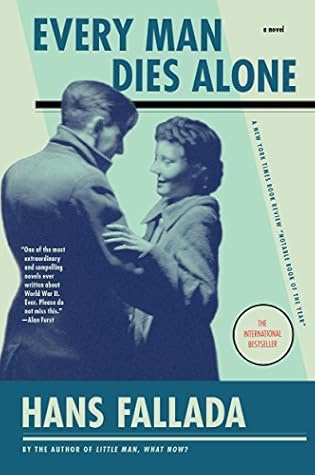More on this book
Community
Kindle Notes & Highlights
“But the main thing is that we remain different from them, that we never allow ourselves to be made into them, or start thinking as they do. Even if they conquer the whole world, we must refuse to become Nazis.”
The Party was everything, and the people nothing.
Anna Quangel felt herself trembling. Then she looked over at Otto again. He might be right: whether their act was big or small, no one could risk more than his life. Each according to his strength and abilities, but the main thing was, you fought back.
(In the year 1940, he had not yet understood, our good Harteisen, that any Nazi at any time was prepared to take not only the pleasure but also the life of any differently minded German.)
Pale-faced, they stared at each other. They were old friends, going back to school days, but now fear had come between them, and fear had brought mistrust with it.
“Show me one that isn’t afraid!” said the brownshirt contemptuously. “And it’s so unnecessary. They just need to do what we tell them.” “It’s because people have got in the habit of thinking. They have the idea that thinking will help them.” “They need to do as they’re told. The Führer can do their thinking for them.”
In other words, the Quangels were like most people: they believed what they hoped.
No one can demand that a man admit his own humiliation.
“Thoughts are free,” they said—but they ought to have known that in this State not even thoughts were free.
They had failed to understand that there was no such thing as private life in wartime Germany. No amount of reticence could change the fact that every individual German belonged to the generality of Germans and must share in the general destiny of Germany, even as more and more bombs were falling on the just and unjust alike.
Because they believe in heaven, they don’t want to fix anything on earth. Always crawl and keep a low profile. Heaven will fix everything. God knows why it’s happening. On the Day of Judgment we’ll find out.
Half the population is set on locking up the other half.
My crime was thinking myself too clever, wanting to do everything by myself, even though I know really that one man is nothing.
It doesn’t matter if one man fights or ten thousand; if the one man sees he has no option but to fight, then he will fight, whether he has others on his side or not. I had to fight, and given the chance I would do it again. Only I would do it very differently.”
“You’re working in the employ of a murderer, delivering ever new victims to him. You do it for money; perhaps you don’t even believe in the man. No, I’m certain you don’t believe in him. Just for money, then…”
Quangel would look at him, this fine gentleman, whom he wouldn’t have known how to talk to in the outside world, and sometimes a doubt would come over him; he wondered whether he had lived the right sort of life, cutting himself off from everyone else in a voluntary self-isolation. Sometimes Dr. Reichhardt would say, “We live not for ourselves, but for others. What we make of ourselves we make not for ourselves, but for others…”
I always thought it was enough if I did my work properly and didn’t mess anything up. And now I learn that there are loads of other things I could have done: play chess, be kind to people, listen to music, go to the theater.
As it was, we all acted alone, we were caught alone, and every one of us will have to die alone. But that doesn’t mean that we are alone, Quangel, or that our deaths will be in vain. Nothing in this world is done in vain, and since we are fighting for justice against brutality, we are bound to prevail in the end.”
Would you rather live for an unjust cause than die for a just one? There is no choice—not for you, nor for me either. It’s because we are as we are that we have to go this way.”
She was to concentrate on the way Jesus Christ had lived his life here on earth, and on how he had loved mankind, including even his enemies. She should interpret the “miracles” in any way that made sense to her, even as beautiful fairytales, but she should take account of the fact that a man had once lived in such a way that even two thousand years later, his influence was still unforgotten, an enduring proof of the fact that love was stronger than hate.
The People’s Court in Berlin, which had nothing to do with the people and to which the people were not admitted even as silent spectators, for most of its sessions were held behind closed doors—this People’s Court was an instance of a perfect system: before any accused person even set foot in the courtroom, that person was for all intents and purposes already condemned, and there was no indication that he or she had anything to hope for in there.
The Quangels’ lack of intellectual sophistication and political impact is paralleled by the numerous other dissidents in Every Man Dies Alone, who sometimes act from idiosyncratic motives, and almost always fail to thwart or damage the regime.
Thus Fallada goes to considerable lengths to create a large number of anti-Nazi dissidents who in practical terms fail almost completely.
The dissidents’ significance as “the righteous few” who redeem the nation is reinforced by the association between their rebellion and their children, who symbolize the nation’s future.


